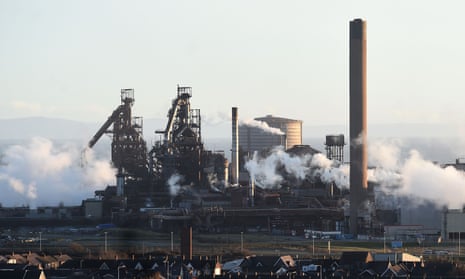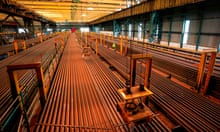The next UK prime minister will be tasked with handling crunch talks with the owner of the UK’s largest steelworks over a demand for £1.5bn in subsidies.
India’s Tata group owns the vast Port Talbot steelworks in south Wales and has been in negotiations over government subsidies to help it either transition to greener production methods or look at site closures.
Sources close to the talks said negotiations had been conducted “at the highest level” between the company and the government.
Outgoing prime minister Boris Johnson has promised not to make any major fiscal decisions before leaving office. Sources said this meant that the Tata talks will be left for the future administrations of prime ministerial candidates Liz Truss and Rishi Sunak to tackle.
It is understood that the business secretary, Kwasi Kwarteng, who is tipped to become chancellor if Truss wins, views the steel industry as of strategic national importance.
Port Talbot employs about 3,500 people and is one of only two plants in Britain capable of turning iron ore and coal into molten iron and steel. Overall, the group’s subsidiary Tata Steel UK (TSUK), which earlier this week reported its first annual profit since 2009, employs about 8,000 people in the UK.
The company has been in protracted talks with the government about a joint investment to convert Port Talbot’s two blastfurnaces into electric arc furnaces, which produce much lower carbon emissions.
The talks had originally focused on Tata attempting to negotiate about £500m in government funding. However, the Financial Times reports that the company is seeking as much as half of the £3bn cost of the conversion and decommissioning process.
“A transition to a greener steel plant is the intention that we have … But this is only possible with financial help from the government,” Natarajan Chandrasekaran, the chair of Tata Group, told the FT.
“We have been in discussions over the last two years and we should come to an agreement within 12 months. Without this, we will have to look at closures of sites.”
The decarbonisation plans would include the closure of the two blastfurnaces, which would stop primary steelmaking, as the two electric arc furnaces are built. Tata wants to begin the conversion process in 2025.
Unions are fearful of job losses, given it takes about two years to build an electric arc furnace, which require fewer workers.
“Our steel members have been put through the wringer for years,” said Charlotte Childs, a national officer at the GMB union. “Tata and the government need to safeguard and futureproof the industry as soon as possible.”
Despite its return to profitability, the company said it still needed UK government support for its steel business to remain viable long term and switch to greener production methods.
“TSUK continues to have discussions with the UK government to seek support for the transition to low-carbon steelmaking, which is a vital part of securing a long-term sustainable future for the business,” it said.
About 80% of UK steel is made in blastfurnaces at two sites: Tata’s Port Talbot plant and a British Steel site at Scunthorpe, Lincolnshire.
“Steel plays a critical role in all areas of the UK economy and Tata is a valued steel producer and significant employer in the UK,” said a spokesperson for the UK government.









